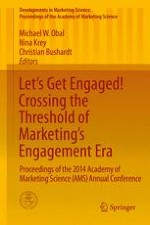2016 | OriginalPaper | Buchkapitel
Evaluation of the Cognitive Effectiveness on Social Media Advertising Formats
verfasst von : Francisco Rejón-Guardia, Francisco J. Martínez-López, Irene Esteban-Millat, Juan Carlos Gázquez-Abad
Erschienen in: Let’s Get Engaged! Crossing the Threshold of Marketing’s Engagement Era
Aktivieren Sie unsere intelligente Suche, um passende Fachinhalte oder Patente zu finden.
Wählen Sie Textabschnitte aus um mit Künstlicher Intelligenz passenden Patente zu finden. powered by
Markieren Sie Textabschnitte, um KI-gestützt weitere passende Inhalte zu finden. powered by
